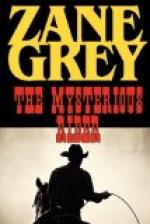“Why, Jack, if the ole man got on to us playin’ a dollar limit he’d fire the outfit,” protested Bludsoe.
This reasonable objection in no wise influenced the old man’s son. He overruled the good arguments, and then hinted at the cowboys’ lack of nerve. The fun faded out of their faces. Lem, in fact, grew red.
“Wal, if we’re agoin’ to gamble, thet’s different,” he said, with a cold ring in his voice, as he straddled a box and sat down. “Wade, lemme some money.”
Wade slipped his hand into his pocket and drew forth a goodly handful of gold, which he handed to the cowboy. Not improbably, if this large amount had been shown earlier, before the change in the sentiment, Lem would have looked aghast and begged for mercy. As it was, he accepted it as if he were accustomed to borrowing that much every day. Belllounds had rendered futile the easy-going, friendly advances of the cowboys, as he had made it impossible to play a jolly little game for fun.
The game began, with Wade standing up, looking on. These boys did not know what a vast store of poker knowledge lay back of Wade’s inscrutable eyes. As a boy he had learned the intricacies of poker in the country where it originated; and as a man he had played it with piles of yellow coins and guns on the table. His eagerness to look on here, as far as the cowboys were concerned, was mere pretense. In Belllounds’s case, however, he had a profound interest. Rumors had drifted to him from time to time, since his advent at White Slides, regarding Belllounds’s weakness for gambling. It might have been cowboy gossip. Wade held that there was nothing in the West as well calculated to test a boy, to prove his real character, as a game of poker.
Belllounds was a feverish better, an exultant winner, a poor loser. His understanding of the game was rudimentary. With him, the strong feeling beginning to be manifested to Wade was not the fun of matching wits and luck with his antagonists, nor a desire to accumulate money—for his recklessness disproved that—but the liberation of the gambling passion. Wade recognized that when he met it. And Jack Belllounds was not in any sense big. He was selfish and grasping in the numberless little ways common to the game, and positive about his own rights, while doubtful of the claims of others. His cheating was clumsy and crude. He held out cards, hiding them in his palm; he shuffled the deck so he left aces at the bottom, and these he would slip off to himself, and he was so blind that he could not detect his fellow-player in tricks as transparent as his own. Wade was amazed and disgusted. The pity he had felt for Belllounds shifted to the old father, who believed in his son with stubborn and unquenchable faith.
“Haven’t you got something to drink?” Jack asked of his companions.
“Nope. Whar’d we git it?” replied Jim.
Belllounds evidently forgot, for presently he repeated the query. The cowboys shook their heads. Wade knew they were lying, for they did have liquor in the cabin. It occurred to him, then, to offer to go to his own cabin for some, just to see what this young man would say. But he refrained.




